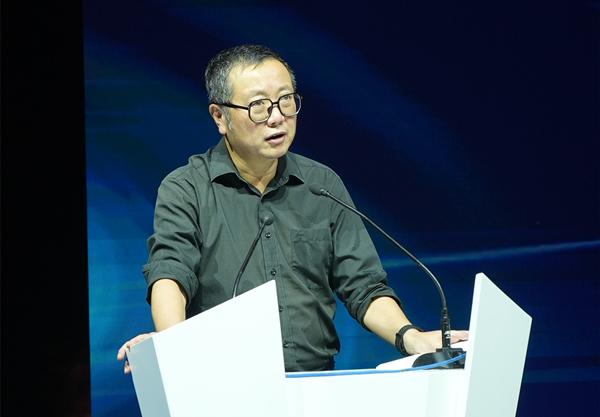
Renowned Chinese author Liu Cixin expressed joy when discussing the Shenzhou-16 crew's recent launch into space on Tuesday. Liu's remarks were made at a sci-fi forum in Beijing, where his work

Liu Cixin, Chinese sci-fi luminary and president of the newly launched Beijing Yuanyu Science Fiction and Future Technology Research Institute, speaks at a forum during the China Science Fiction Convention (CSFC), held in Beijing, May 30, 2023. [Photo courtesy of the CSFC Organizing Committee]
"We're accustomed to the success of China's spaceship launches, but this time, the presence of a payload expert among the three astronauts caught my attention," Liu said. "This is a first. He's not military. We now have a man who is more of a researcher and scientist working on China's space station, a significant step towards opening space to ordinary people in the future."
The taikonaut Liu referred to is Gui Haichao, a professor at Beihang University in Beijing. Gui will serve as a payload expert, managing the in-orbit operations of scientific experiment payloads on China's Tiangong space station. Alongside Gui, two additional taikonauts, Jing Haipeng and Zhu Yangzhu, have joined the Tiangong station for a space mission estimated to last approximately five months.
Liu is currently attending the China Science Fiction Convention (CSFC) 2023, which started Monday in Beijing. During a Tuesday afternoon forum, he discussed his artistic vision and examined the narrative of his novella "Earth Artillery," set to be adapted into a short film later this year.
"Science fiction literature carries a unique aesthetic focus, primarily focused on the aesthetics of science and technology. While rare in the history of arts and literature, it's a fundamental aesthetic element of sci-fi," Liu noted. He further explained that the beauty of science is primarily manifested through its simplicity, harmony, and symmetry, while technology's beauty lies in the intricate and dynamic creations of humankind.
Liu is fascinated by the grand approach of sci-fi literature, which presents a picture that goes beyond people's everyday lives and experiences to form stunning spectacles.
"Sci-fi literature aims to evoke a sense of grandeur and grasp the universe's scale through detailed descriptions. It's a challenging task to make people feel this immensity and intellectually comprehend the cosmos' vastness. Moreover, illustrating the relationship between the immense cosmic scale and the insignificance of an individual is incredibly difficult. Throughout my entire career, I've always strived to achieve this, albeit with varying degrees of success," the writer said.
Liu also shared that, despite Chinese audiences lauding the film "The Wandering Earth" for its embodiment of the Chinese spirit and solutions, he had never explicitly set out to emphasize these elements in his original work. He acknowledged and commended the filmmakers for their expanded adaptation, but in his novella, his original intention was to encapsulate the reactions of the entire human race to the epic disaster, aiming to tell a universal story.
"I want to point out that reader feedback often surprises me. I've discovered that 90% of what readers derive from my work are things I hadn't thought about. But this is a good thing. It means I have opened the door for them to uncover various new and profound elements within my work."
He acknowledged the film and TV creators who have adapted sci-fi literary works into successful blockbusters, like the "Wandering Earth" franchise and the "Three-Body" series based on his own works. He expressed an understanding of the necessary compromises these adaptations must make to appeal to audiences, and he commended them for striking a balance between staying true to the original stories and creating fresh content.
The author emphasized that introducing sci-fi content into the education of Chinese children and young people is currently an optimal way to nurture and sustain their imaginations, which is crucial in keeping China at the forefront of science, technology, and innovation.
